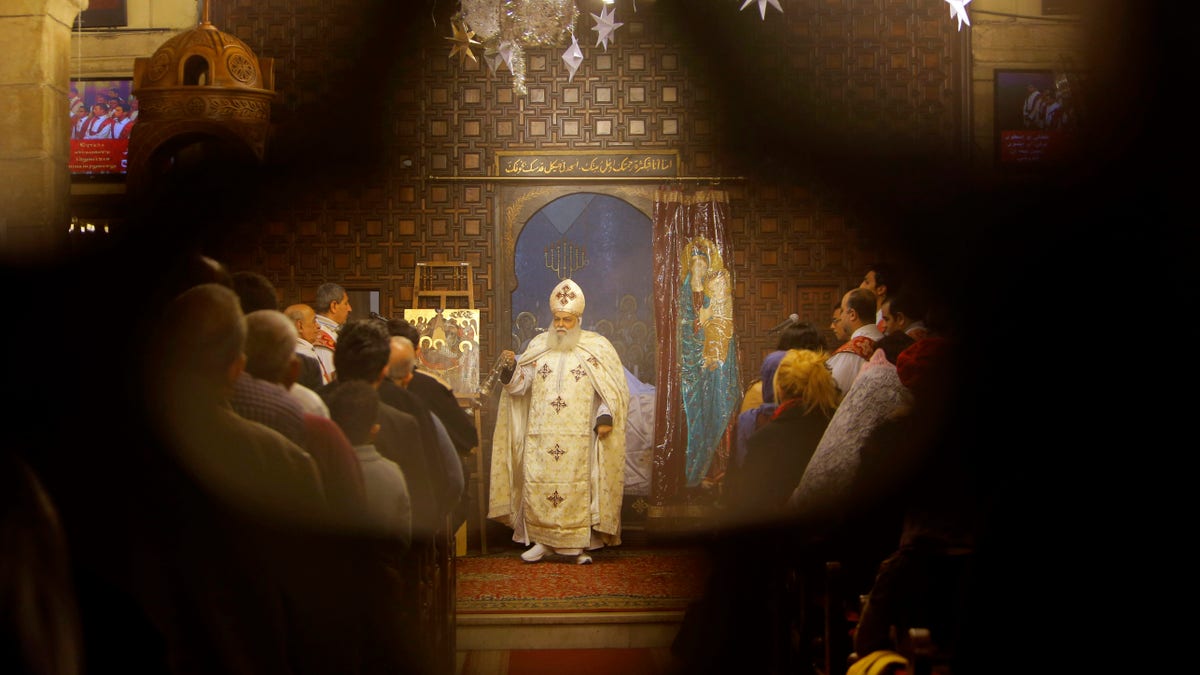
FILE -- Jan. 6: Bishop Aclimandos leads Coptic Christmas Eve mass at the Virgin Mary church in Cairo, Egypt. Egypt's Coptic Christians, who make up about 10 percent of the country's 90 million people, are the largest Christian community in the Middle East. (AP Photo/Amr Nabil)
If you walk down bustling Adly Street in downtown Cairo, it is easy to miss the large gray building. But if you trace the address and stop there, you’ll notice the Stars of David carved on the walls. And then you’ll see the security checkpoint and the guards.
If you want to go into the Adly Street Synagogue and its offices, you must surrender your passport or other identity documents.
Certainly, the plainclothes security men are there to protect the synagogue and those close by — but they are also able to keep a detailed record of all those who visit.
[pullquote]
My colleague Sam Tadros and I visited there in February to meet Magda Haroun, the leader of Egypt’s tiny remaining Jewish community. In living memory there were nearly 100,000 Jews in Egypt. Just weeks ago there were 15 left in all the country: 12 in Cairo, three in Alexandria. All were aged, and only one was a man.
Last month, after the death of Magda’s sister, Nadia, there are only 14.
There is no rabbi, so there are no Jewish marriages, even if there were any Jews of marriageable age and prospect.
When we met Magda, a part of her seemed tired and weary, a jaded realist knowing all too well the bleak prospects for her people in Egypt. Yet she was also full of energy, and even of guarded hope.
She told us she did not work to preserve her living community, which dates back to Moses and is probably the second oldest Jewish community in the world. That community will end very soon; and for the foreseeable future, it will not return.
What she works for instead is to protect and preserve the heritage and memory of Jewish life in Egypt. She takes care of 17 synagogues in Cairo, and she hopes she can help create a museum of Egyptian Jewish life.
She is driven by the commitment and hope that people will not be able to forget that “there were once Jews in Egypt.”
Magda was also the first leader of the Jewish community to be invited to the installation of Pope Tawadros, chosen in 2013 to head the Coptic Orthodox church, home to over 90 percent of Egypt’s Christians. The term “Copt” is simply a brief form of “Egypt,” and this church traces its origins back to St. Mark, the author of Mark’s Gospel.
Egypt’s Christians, some 10 percent of the population, are by far the largest non-Muslim minority in the Middle East, and they are now also under threat.
On Aug. 14 last year, in one single day, 41 churches in Egypt were razed in a matter of hours. This was probably the largest single pogrom against Egypt’s Christians in the last 700 years.
Amnesty International reports that over 150 other Christian buildings were attacked on that day and the two days that followed. The attacks came from Muslim Brotherhood supporters after the Egyptian military attacked their armed camps and demonstrations in Cairo. Many Brotherhood members have apparently decided to make Christians the scapegoats for the army’s removal of their political leader, President Mohamed Morsi, and their attacks on Copts continue to this day.
In the face of threats and attacks in the last three years, many Copts — perhaps over 100,000 —have fled Egypt.
Knowing this, and knowing the history of her own people, Magda felt compelled to give a message when she met with Pope Tawadros. She knew, of course, that he already shared her fear, and in any case, no member of the clergy wants his flock to flee.
But in the contemporary Middle East, the message is so immediate and stark, and the histories so parallel, that Magda knew it must still be said. From a remaining Jew to threatened Christians: “Do not let your people leave. Do all that you can so that you do not become as we are…”
